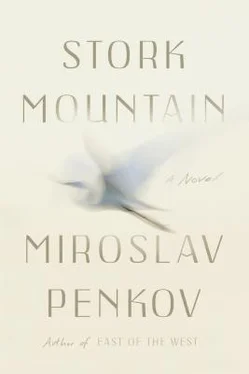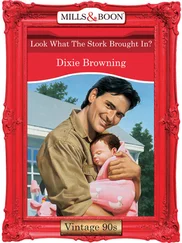Miroslav Penkov - Stork Mountain
Здесь есть возможность читать онлайн «Miroslav Penkov - Stork Mountain» весь текст электронной книги совершенно бесплатно (целиком полную версию без сокращений). В некоторых случаях можно слушать аудио, скачать через торрент в формате fb2 и присутствует краткое содержание. Год выпуска: 2016, Издательство: Farrar, Straus and Giroux, Жанр: Современная проза, на английском языке. Описание произведения, (предисловие) а так же отзывы посетителей доступны на портале библиотеки ЛибКат.
- Название:Stork Mountain
- Автор:
- Издательство:Farrar, Straus and Giroux
- Жанр:
- Год:2016
- ISBN:нет данных
- Рейтинг книги:4 / 5. Голосов: 1
-
Избранное:Добавить в избранное
- Отзывы:
-
Ваша оценка:
- 80
- 1
- 2
- 3
- 4
- 5
Stork Mountain: краткое содержание, описание и аннотация
Предлагаем к чтению аннотацию, описание, краткое содержание или предисловие (зависит от того, что написал сам автор книги «Stork Mountain»). Если вы не нашли необходимую информацию о книге — напишите в комментариях, мы постараемся отыскать её.
Stork Mountain — читать онлайн бесплатно полную книгу (весь текст) целиком
Ниже представлен текст книги, разбитый по страницам. Система сохранения места последней прочитанной страницы, позволяет с удобством читать онлайн бесплатно книгу «Stork Mountain», без необходимости каждый раз заново искать на чём Вы остановились. Поставьте закладку, и сможете в любой момент перейти на страницу, на которой закончили чтение.
Интервал:
Закладка:
“What is your name?” Grandpa asked the driver.
“Elmaz. But everyone calls me Little Shovel.”
“And yours?”
“Just Shovel,” the tall one said.
“Well, that’s no good.” And then to me: “We’ll have to think of something better.”
We named the stork as it was only fair, considering the feast day: Flavius Valerius Aurelius Constantinus Augustus. The First. The Great. Saint Kosta of the Storks.
THREE
THAT EVENING, after he fed Saint Kosta a few morsels of soaked bread, after he squeezed water into his bill from a rag and tightened the bandage on the splintered wing, Grandpa complained of needles in his arm. Like vultures, storks bloodied with setting sun drew large cartwheels above the wreckage of houses, above their ruined nests and dead babies. Their shrieks were knives in Grandpa’s leg.
His tongue tied up into a ball when the imam called from the mosque to prayer and there was nothing I could do but force him to take his pills and lay him down in bed. He had a stroke soon after.
I thought of running to Elif’s. Humiliation and defeat be damned, I’d phone for a doctor. But first, how long before I reached her house? And then, how long before the ambulance made it to Klisura?
I’d never felt as helpless as I did right then. Dark all around me and Grandpa’s labored breathing, the flapping of a broken wing out in the yard. A single thought persisted — my fault. All of it, because of me.
How I wanted to throw the window open and whistle. Not a singsong call for help or pity. I wanted to whistle until another living soul answered and told me I wasn’t all alone. And I suppose I wasn’t. By the bed, holding Grandpa’s hand, it struck me I should be grateful. We were spending this final moment together.
The night lived, grew old, and was dying. First cocks crowed from the Muslim hamlet and dawn found Grandpa still breathing, with heaviness that gradually seemed to scatter. Saint Kosta cried hungry from the yard and Grandpa’s breathing quickened. He spoke as if his tongue had swollen up tenfold. “Go feed the saint.”
FOUR
“‘PACK YOUR BAGS and say your farewells,’ the principal told me that morning. ‘They’re moving you to another school in another district.’ I thought he was joking. Gave him a smile even. ‘No jokes here,’ he said, ‘only Party orders. Straight from the Politburo.’
“‘Where am I being moved to?’ I asked him. He had to recheck the order. ‘Klisura,’ he said. ‘Which is where, exactly?’ In place of an answer, he pulled out a bottle. ‘It’s this bad, is it?’ I locked the door to his office and took the glass he offered. ‘ Naboré ,’ he said, ‘an apology is all the Party wanted. How hard was it to say I’m sorry ?’ We downed the drinks and refilled the glasses. I told him I wasn’t sorry. ‘Well,’ he said, ‘soon you will be.’”
More than four decades ago. Halfway through the spring semester. My grandfather on a train to Pleven. In Turnovo he took the monorail, crossed the Balkan Mountains. Rode the train to Burgas. Rocked on a bus to Sozopol, but at least there was the sea to look at out the window. Thumbed down a Moskvich at the bus stop. “There’s something fishy about you,” the driver told him. “No honest man goes about with two suitcases. And each weighs a ton. Open them. Books and notepads? Subversive literature, no doubt. My gut tells me I should call the militia.” Ten levs convinced his gut to tell him a different story. He took Grandpa to Kiten, but no more money would make him put his Moskvich through the dirt roads that followed.
At sunset a horse-drawn carriage passed by. Grandpa rode it as far as a roadside inn and spent the night there devoured by bedbugs. Peasants were snoring all around him from their bunks and he couldn’t sleep until morning. When he woke up, the sun was still rising.
“I’m a man of God,” someone was shouting downstairs. “I can’t be expected to handle money.”
“You ate, you drank, you slept in a bed,” the innkeeper was saying. “You used the bathroom even.”
“I certainly didn’t! Check the bushes if you don’t believe me.”
By the time Grandpa came down, a crowd of kibitzers had gathered to watch the circus. True enough, the man who refused to pay was a priest — but funny-looking. His cassock, black as coal, hung on his narrow shoulders like a ripped sack. The kalimavka was too large for his head and fell down to his eyes almost.
“And where is your beard?” someone hollered.
The priest combed his measly goatee with his nails to puff it up a little. “Lord forgive them!”
All this embarrassed Grandpa and he paid the man’s expenses.
“It’s not about the money,” the priest said outside the inn, in place of a thank-you. “I remember my grandfather. I remember Father. The skin on their knuckles always soggy from all the hand-kissing. And they never went about hungry. Breakfast at one widow. Dinner at another. At lunch — a funeral, a christening, a wedding. And now this. Comrades and red flags.” He spat in the dirt and crossed himself three times. Then he went to use the bathroom.
His name was Father Dionysus, but everyone called him “the Pope.” He was three years younger than Grandpa — so thirty then — and like Grandpa he had been dispatched to Klisura.
“A troubled kind of flock,” the Pope said dreamily of the Klisuran people. The two of them were riding in the back of a cart to another village, where they would get onto another cart, and so on. “Godless, the pour souls.” He’d extorted some breakfast from the driver and now he set down the cheese on his belly so he could make the sign of the cross a few times. “They dance in fire there, like heretics. Like pagans.” Last month, the metropolitan himself had called him over to his throne. “Father Dionysus,” the metropolitan had beckoned, “the people of Klisura have lost their way. They’ve let an ancient heresy estrange them from the good Lord. Restore them to the righteous path.”
Only later, in a moment of intoxication, did the Pope reveal to Grandpa the “truthful” reason for his relocation — a funeral, a demijohn of rakia , confusion in the holy chants, and a freshly baptized corpse. But in the end that too turned out to be a lie. It took my grandfather three whole years to realize it wasn’t the Christians of Klisura that Father Dionysus had been instructed to reform. It was the Muslims that the Communist Party had sent him to christen.
Three days and six carts later the two of them arrived in Klisura. The news that the Pope and the teacher were coming together had reached the village long before them and so, once they were on the square, it felt like their cart was being dragged about by a stream of sunburned faces, glittering eyes, and bushy mustaches. Old and young, men, women, children, a startling multitude of hands was reaching up to touch them the way Doubting Thomas had once touched Christ’s wounds.
Or so Father Dionysus told Grandpa. Fur caps flew in the air, bagpipes screeched, a drum joined it, and voices merged in a joyous song. For the first time in fifteen years the village was welcoming a priest. For the first time in thirty — a schoolmaster. And through this sea of chaos, the voice of Father Dionysus, fortified by the realization of his great importance, echoed in command: “You there, with the donkey teeth. You look like a burly fellow. Take the teacher’s suitcases. And you, with the demijohn. Is it wine for the welcome? Here, let me do a tasting. And hold my bags, but carry them as though a holy relic.”
“Father,” the people were calling around him. “Shall we take you to the church?”
“Take me,” he said, “but first to lunch. The church has no feet to run away. But my feet are tired. I’m hungry for banitsa and roasted hen on the spit. For chicken, musaka, gyuvech …”
Читать дальшеИнтервал:
Закладка:
Похожие книги на «Stork Mountain»
Представляем Вашему вниманию похожие книги на «Stork Mountain» списком для выбора. Мы отобрали схожую по названию и смыслу литературу в надежде предоставить читателям больше вариантов отыскать новые, интересные, ещё непрочитанные произведения.
Обсуждение, отзывы о книге «Stork Mountain» и просто собственные мнения читателей. Оставьте ваши комментарии, напишите, что Вы думаете о произведении, его смысле или главных героях. Укажите что конкретно понравилось, а что нет, и почему Вы так считаете.











